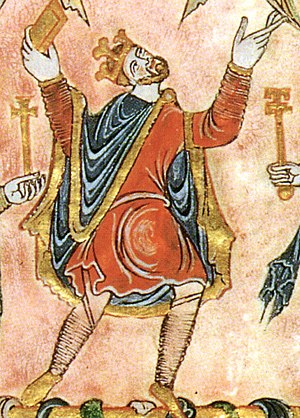959
 From Wikipedia the free encyclopedia
From Wikipedia the free encyclopedia
This article needs additional citations for verification. (September 2018) |
| Millennium: | 1st millennium |
|---|---|
| Centuries: | |
| Decades: | |
| Years: |
| 959 by topic |
|---|
| Leaders |
| Categories |
| Gregorian calendar | 959 CMLIX |
| Ab urbe condita | 1712 |
| Armenian calendar | 408 ԹՎ ՆԸ |
| Assyrian calendar | 5709 |
| Balinese saka calendar | 880–881 |
| Bengali calendar | 366 |
| Berber calendar | 1909 |
| Buddhist calendar | 1503 |
| Burmese calendar | 321 |
| Byzantine calendar | 6467–6468 |
| Chinese calendar | 戊午年 (Earth Horse) 3656 or 3449 — to — 己未年 (Earth Goat) 3657 or 3450 |
| Coptic calendar | 675–676 |
| Discordian calendar | 2125 |
| Ethiopian calendar | 951–952 |
| Hebrew calendar | 4719–4720 |
| Hindu calendars | |
| - Vikram Samvat | 1015–1016 |
| - Shaka Samvat | 880–881 |
| - Kali Yuga | 4059–4060 |
| Holocene calendar | 10959 |
| Iranian calendar | 337–338 |
| Islamic calendar | 347–348 |
| Japanese calendar | Tentoku 3 (天徳3年) |
| Javanese calendar | 859–860 |
| Julian calendar | 959 CMLIX |
| Korean calendar | 3292 |
| Minguo calendar | 953 before ROC 民前953年 |
| Nanakshahi calendar | −509 |
| Seleucid era | 1270/1271 AG |
| Thai solar calendar | 1501–1502 |
| Tibetan calendar | 阳土马年 (male Earth-Horse) 1085 or 704 or −68 — to — 阴土羊年 (female Earth-Goat) 1086 or 705 or −67 |

Year 959 (CMLIX) was a common year starting on Saturday (link will display the full calendar) of the Julian calendar.
Events
[edit]By place
[edit]Byzantine Empire
[edit]- April - May – The Byzantines refuse to pay the yearly tribute. A Hungarian army, led by Apor, invades Macedonia and Thrace. He plunders its territories until reaching Constantinople. On his way back, Apor is defeated during a night attack by Byzantine forces.[1]
- November 9 – Emperor Constantine VII Porphyrogennetos ("born in the purple") dies at Constantinople after a 46-year reign. He is succeeded by his 21-year-old son Romanos II as ruler of the Byzantine Empire.
- Winter – Romanos II appoints Leo Phokas (the Younger) to be commander of the Byzantine field army (Domestic of the Schools) in the West. The Phokas clan becomes one of the leading families in Constantinople.
Europe
[edit]- Bruno I, archbishop and duke (archduke) of Lotharingia resigns. His brother, King Otto I divides the duchy in two parts – Upper Lorraine and Lower Lorraine. He appoints Frederick I and Godfrey I as margraves (vice-duke).
- Pietro III Candiano, doge of Venice, dies after a 17-year reign. He is succeeded by his son Pietro IV Candiano, who breaks off his campaign in Spoleto on behalf of King Berengar II of Italy and returns to Venice.
- Pietro IV Candiano divorces his wife Joanna for political reasons and banishes her as a nun to the monastery of San Zaccaria.
England
[edit]- October 1 – King Eadwig dies after a 4-year reign. He is succeeded by his 16-year-old brother Edgar I (the Peaceful), who effectively completes the unification of England, when Northumbria submits to his rule.
By topic
[edit]Religion
[edit]- Dunstan, bishop of Worcester and London, is appointed by Edgar I as archbishop of Canterbury and becomes his chief adviser.
Births
[edit]- April 12 – En'yū, emperor of Japan (d. 991)
- Yeshe-Ö, Tibetan lama-king (approximate date)
- Zhao Defang, prince of the Song Dynasty (d. 981)
Deaths
[edit]- July 27 – Chai Rong, emperor of Later Zhou (b. 921)
- October 1 – Eadwig (the All Fair), king of England
- October 3 – Gérard of Brogne, Frankish abbot
- November 9 – Constantine VII, Byzantine emperor (b. 905)
- Ælfsige (or Aelfsige), archbishop of Canterbury
- Chen Jue, Chinese official and chief of staff
- Donnchadh mac Urchadh, king of Maigh Seóla (Ireland)
- Han Yanhui, Chinese Khitan chancellor (b. 882)
- Pietro III Candiano, doge of Venice
- Song Qiqiu, Chinese chief strategist (b. 887)
References
[edit]- ^ Bóna, Istvá (2000). The Hungarians and Europe in the 9th-10th centuries. Budapest: Historia - MTA Történettudományi Intézete, p. 33. ISBN 963-8312-67-X.